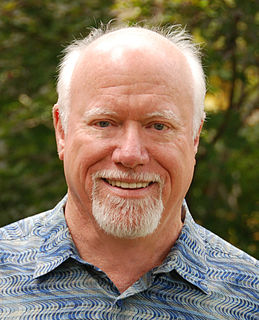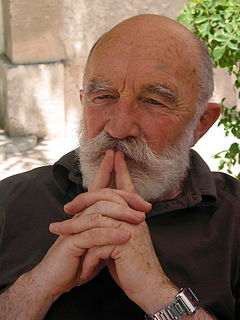Top 1161 Perceived Quotes & Sayings - Page 19
Explore popular Perceived quotes.
Last updated on April 22, 2025.
I think it's an American curse that most of us think we are special. ... everyone believes themselves to be superior to the majority of the population in some way. Sometimes it's their looks, other times their perceived sex appeal (often in obvious defiance of their looks), and other times it is their real or imagined talent for acting, writing, painting or banging on the drums. And because people are so susceptible to flattery, there exists an entire industry made up of scam artists whose sole goal is to fleece the flatterable.
There's been an amazing backlash for the last decade in America: political correctness. In many ways, I think that, while we've been remarkably violent in our media, there's been a real schizophrenia. In private, on the Internet, and on public-affairs shows or talk radio, we're way more explicit than we've ever been. But traditional Hollywood has been much more frightened than it ever was in the '70s about presenting things that could be perceived as politically incorrect.
After the Second World War, facilitating the establishment of the UN and aiding the reconstruction of Europe, the United States was widely viewed, at least in the West, as a benevolent hegemon. In the non-West, the US was often perceived as a supporter of the colonial powers in their struggle to maintain control over their colonial possessions, and was viewed far more critically, especially by emerging elites that were more inclined to socialist development paradigms than to the capitalist ethos favoured by Washington.
Spirituality is the master key of the Indian mind. It is this dominant inclination of India which gives character to all the expressions of her culture. In fact, they have grown out of her inborn spiritual tendency of which her religion is a natural out flowering. The Indian mind has always realized that the Supreme is the Infinite and perceived that to the soul in Nature the Infinite must always present itself in an infinite variety of aspects.
I think I'm too indoctrinated. I'm going to use everything I can, and I think if I used an advertisement in that one, it would be yet another way to connect the current day with Wharton. Wharton has been perceived sometimes as being too upper class; Wharton was an extraordinary social thinker. As relevant today as anyone, so she uses some language that isn't current, but to me, I'm so happy about that because I get so bored with the 100 words that people mostly use.
For example, you now look at pictures from 1968, they are hugely misleading in terms of standing in as an absolute image of the time. Because maybe two percent of the people looked the way that we now associate with that time. I was also aware that what I was aiming for is an idealized, utopian version of how people could be together. I found photography to be a very powerful tool because as long as it looks real, it is perceived as real.
The history of the welfare state is the history of public enterprise pushing out private organization. The impact was largely unintentional, but natural and inevitable. Higher taxes left individuals with less money to give; government's assumption of responsibility for providing welfare shriveled the perceived duty of individuals to respond to their neighbors' needs; and the availability of public programs gave recipients an alternative to private assistance, one which did not challenge recipients to reform their destructive behavior.
It is impossible for you to judge a person about his divinity unless and until the Kundalini reaches at least this part, which is the limbic area. You cannot make out whether a person is real or not, whether a guru is real or not. Because divinity cannot be perceived through your brain, unless and until this light of your Spirit shines into it.
As I considered the matter carefully it gradually came to light that all those matters only were referred to mathematics in which order and measurements are investigated, and that it makes no difference whether it be in numbers, figures, stars, sounds or any other object that the question of measurement arises. I saw consequently that there must be some general science to explain that element as a whole which gives rise to problems about order and measurement, restricted as these are to no special subject matter. This, I perceived was called 'universal mathematics'.
The past is never dead. It's not even past. All of us labor in webs spun long before we were born, webs of heredity and environment, of desire and consequence, of history and eternity. Haunted by wrong turns and roads not taken, we pursue images perceived as new but whose providence dates to the dim dramas of childhood, which are themselves but ripples of consequence echoing down the generations. The quotidian demands of life distract from this resonance of images and events, but some of us feel it always.
Through all the centuries of the worship of the mindless, whatever stagnation humanity chose to endure, whatever brutality to practice-it was only by the grace of the men who perceived that wheat must have water in order to grow, that stones laid in a curve will form an arch, that two and two make four, that love is not served by torture and life is not fed by destruction-only by the grace of those men did the rest of them learn to experience moments when they caught the spark of being human.
That mercy towards one set of creatures was cruelty towards another sickened his sense of harmony. As you got older, and felt yourself to be at the center of your time, and not at a point in its circumference, as you had felt when you were little, you were seized with a sort of shuddering, he perceived. All around you there seemed to be something glaring, garish, rattling, and the noises and glares hit upon the little cell called your life, and shook it, and warped it.
The belief in an external world independent of the perceiving subject is the basis of all natural science. Since, however, sense perception only gives information of this external world or of "physical reality" indirectly, we can only grasp the latter by speculative means. It follows from this that our notions of physical reality can never be final. We must always be ready to change these notions - that is to say, the axiomatic basis of physics - in order to do justice to perceived facts in the most perfect way.
Many of you would like to take evil and step on it, destroying it like you would a bug. Squish, smash! Begone into another reality! This practice of eliminating human life because it is perceived as evil does you no good. In the end your history and experience are filled with war of one kind or another; humans fighting one another for the right to speak their truth and share their perception.And one human or another is always wanting to suppress someone else's ideas, someone else's thinking.
We put pride into everything like salt. We like to see that our good works are known. If our virtues are seen, we are pleased; if our faults are perceived, we are sad. I remark that in a great many people; if one says anything to them, it disturbs them, it annoys them. The saints were not like that - they were vexed if their virtues were known, and pleased that their imperfections should be seen.
We're finally becoming aware of a process that has been unconscious since human experience began. From the start, humans have perceived a Birth Vision, and then after birth have gone unconscious, aware of only the vaguest of intuitions. At first in the early day of human history, the distance between what we intended and what we actually accomplished was very great, and then, over time, the distance has closed. Now we're the verge of remembering everything.
I believe a good writer can write a good book with any sort of character, in any sort of setting, but I prefer to write about the outsider. It might just be because I've been one (or perceived myself to be one) for so much of my life. But the simple fact of being marginalized immediately brings conflict to a story before the narrative even begins, and that's gold for a writer because it means that your character already has depth before events begin to unfold.
[I have] my own view about [Bob] Dylan's Nobel prize. Which is, I'm firmly in the Nay camp. I do think the award is a category error, but that's not why. Not in itself. What bothers me is the perceived status of the categories. If pop lyricists were routinely considered for the prize as are authors and poets, I'd still think it mistaken, but I wouldn't much care. But I am quite certain that Joni Mitchell and Leonard Cohen, for example, both at the very least Dylan's equals as writers, have never been in the running and never will be.
In any new situation, whether it involves an elevator or a rocket ship, you will almost certainly be viewed in one of three ways. As a minus one: actively harmful, someone who creates problems. Or as a zero: your impact is neutral and doesn't tip the balance one way or the other. Or you'll be seen as a plus one: someone who actively adds value. Everyone wants to be a plus one, of course. But proclaiming your plus-oneness at the outset almost guarantees you'll be perceived as a minus one, regardless of the skills you bring to the table or how you actually perform.
The character truest to itself becomes eccentric rather than immovably centered, as Emerson defined the noble character of the hero. At the edge, the certainty of borders gives way. We are more subject to invasions, less able to mobilize defenses, less sure of who we really are, even as we may be perceived by others as a person of character. The dislocation of self from center to indefinite edge merges us more with the world, so that we can feel blest by everything.
But, in conformity to His wisdom it was right that afterwards the Prophet should be sent back from the vision of pure Unity and that he should return . . . toward the separative vision. For, He created man and jinn only that they should worship Him and know Him - and, if they remained at the degree of pure Unity, there would be none to worship Him. In this separative vision, the Worshipped and the worshipper, the Lord and the servant, the Creator and the creature are again perceived.
It always comes back to our insecurities, as we say, "Oh, I'm not as good as you." So instead of accepting that perhaps I am not as good as someone else in some ways and being comfortable with who I am as I am, I spend all my time denigrating you, trying to cut you down to my self-perceived size. The sad problem is that we see ourselves as being quite terribly small. Instead of spending my time being envious, I need to celebrate your and my different gifts, even if mine are perhaps less spectacular than yours.
Civilization after civilization, it is the same. The world falls to tyranny with a whisper. The frightened are ever keen to bow to a perceived necessity, in the belief that necessity forces conformity, and conformity a certain stability. In a world shaped into conformity, dissidents stand out, are easily branded and dealt with. There is no multitude of perspectives, no dialogue. The victim assumes the face of the tyrant, self-righteous and intransigent, and wars breed like vermin. And people die.
We can no longer contemplate the subject - self - of contemporary art; it has been woven into infinite relationships, replaced by social movements, national image, and financial capital. The disappearance of the construction of the self of contemporary art makes it impossible to exist in the form of a subject. The subject of contemporary art that I speak of is a kind of naming event predicated upon the multiplicity of the environment. It includes politics, should have its own way of thinking, and can be perceived.
The Jewish Talmud says that the righteous peoples have an equal place in paradise. The Christians and Muslims agree in rejecting that; they claim that they are the fortunate recipients of God's final message and those who accepted will go to heaven and those who rejected go to hell. So there is a long struggle between the Dar al-Islam and the Dar al-Harb, which in effect was Christendom. This was the perceived enemy. And this has inevitably colored the perception of everything else.
Germany will always do the minimum to preserve the euro. Doing the minimum, though, will perpetuate the situation where the debtor countries in Europe have to pay tremendous premiums to refinance their debt. The result will be a Europe in which Germany is seen as an imperial power that will not be loved and admired by the rest of Europe - but hated and resisted, because it will perceived as an oppressive power.
We could almost say that being willing to be a fool is one of the first wisdoms. So acknowledging foolishness is always a very important and powerful experience. The phenomenal world can be perceived and seen properly if we see it from the perspective of being a fool. There is very little distance between being a fool and being wise; they are extremely close. When we are really, truly fools, when we actually acknowledge our foolishness, then we are way ahead. We are not even in the process of becoming wise — we are already wise.
Science sometimes improves hypotheses and sometimes disproves them. But proof would be another matter and perhaps never occurs except in the realms of totally abstract tautology. We can sometimes say that if such and such abstract suppositions or postulates are given, then such and such abstract suppositions or postulates are given, then such and such must follow absolutely. But the truth about what can be perceived or arrived at by induction from perception is something else again.
For many ages it has been allowed by sensible men, Nihil est in intellectu quod non fuit prius in sensu: That is, There is nothing in the understanding which was not first perceived by some of the senses. All the knowledge which we naturally have is originally derived from our senses. And therefore those who want any sense cannot have the least knowledge or idea of the objects of that sense; as they that never had sight have not the least knowledge or conception of light or colours.
I feel any time you enter a dream world it's like you're working out things, it's all inside your mind and you're working it out, be it Dorothy in The Wizard of Oz, or the kids in Narnia, they go through this weird journey that's not real, and they're going through this journey psychologically. It's that journey of discovery, of getting onself together, that fantasy and fairy tales are so good at. And while some people still look upon them as completely unrealistic, for me they're more real than most things that are perceived as real.
I believe that pity is a law like justice, and that kindness is a duty like uprightness. That which is weak has a right to the kindness and pity of that which is strong. In the relations of man with the animals...there is a great ethic, scarcely perceived as yet, which will at length break through into the light, and which will be the corollary and the complement to humans ethics. Are there not here unsounded depths for the thinker? Is one to think oneself mad because one has the sentiment of universal pity in one's heart?
It's instructive to consider the more spectacular and well-known falls from grace of leaders in the public eye... In the main, the issues behind these falls could be grouped under a lack of competence, a lack of support or loyalty from those they sought to lead, and a lack of failure of integrity. Of all these the last is the most egregious, the most fatal. We so much want our leaders to be unfailingly decent that an obvious or perceived flaw in integrity can be the toxin which kills them off.
I do not know how history will judge me, but let me say that I've spent a lot of time and energy trying to transform the Tatas from a patriarchal concern to an institutional enterprise. It would, therefore, be a mark of failure on my part if it were perceived that Ratan Tata epitomises the Group's success. What I have done is establish growth mechanisms, play down individuals and play up the team that has made the companies what they are. I, for one, am not the kind who loves dwelling on the 'I'. If history remembers me at all, I hope it will be for this transformation.
Everyone has options. They are a fixed set of predetermined scenarios, points of view, perceived limitations that already reside in your data bank. If you depend on your options to formulate your future, that future will be no more than a rearrangement of your past. Then he says, “Possibilities are completely different. When you ask ‘what is possible?’ you must stretch your imagination out of the confines of the familiar. To live a life beyond the mediocre, ask not ‘what are my options?’ but ‘What is possible?’
The definition of horror is pretty broad. What causes us "horror" is actually a many splendored thing (laughs). It can be hard to make horror accessible, and that's what I think Silence of the Lambs did so brilliantly - it was an accessible horror story, the villain was a monster, and the protagonist was pure of heart and upstanding so it had all of these great iconographic elements of classic storytelling. It was perceived less as a horror movie than an effective thriller, but make no mistake, it was a horror movie and was sort of sneaky that way.
As a mode of perception that often becomes a style of life, paranoia weaves around the vulnerable self or group an air-tight metaphysic and world view. Paranoia is an antireligious mysticism based on the feeling or perception that the world in general, and others in particular, are against me or us. Reality is perceived as hostile. By contrast, the religious mystic experiences the ground of being as basically friendly to the deepest needs of the self. That which is unknown, strange, or beyond our comprehension is with and for rather than against us.
As the mental endowment of a man varies with the organisation of his accumulated experiences, the better endowed he is, the more readily will he be able to remember his whole past, everything that he has ever thought or heard, seen or done, perceived or felt, the more completely in fact will he be able to reproduce his whole life. Universal remembrance of all its experiences, therefore, is the surest, most general, and most easily proved mark of a genius.
When listening to the sound material, we metamorphose the inside into an outside. This notion of metamorphosis is one of the principles that leads the course of the musical suite, reflecting changes (fluidsolid passages: water/ice/fire) or movements (ebb/flow/wave, inspiration/expiration) or inside-outside passages (door/individual/crowd). Thus, the perceived object is not entirely what we would have liked it to be. Our music brings us closer to some while it takes us away from others: each with their own inside.
True spiritual knowledge has sometimes flourished most grandly in some who were without eloquence and almost illiterate. And this is very clearly shown by the case of the Apostles and many holy men, who did not spread themselves out with an empty show of leaves, but were bowed down by the weight of the true fruits of spiritual knowledge: of whom it is written in Acts: 'But when they saw the boldness of Peter and John, and perceived that they were ignorant and unlearned men, they were astonished' (Acts 4:13).
We judge people in areas where we’re vulnerable to shame, especially picking folks who are doing worse than we’re doing. If I feel good about my parenting, I have no interest in judging other people’s choices. If I feel good about my body, I don’t go around making fun of other people’s weight or appearance. We’re hard on each other because we’re using each other as a launching pad out of our own perceived deficiency.
Your Saying "God is Most Great" does not mean that He is greater than something else, since there is nothing else alongside of Him, so that it could be said that He is greater than it. Rather, the meaning of Allahu Akbar is that He is much too great to be perceived by the senses or for the depths of His Majesty to be reached by reason and logic, and indeed, that He is much too great to be known by an other-than-Him for truly, no one knows God but God.
In the 1920s, everyone wanted to be a celebrity. Everyone wanted to be like Babe Ruth or Charles Lindbergh. ... Businessmen, in particular, in the '20s really believed that to be a success, an entrepreneur needed to have a personality, a sense that you were a success. That's why I think Capone dressed the way he did. And that's why he entertained the press — because he wanted to be perceived as a successful American. Dale Carnegie ... would later cite Capone as a model for creating the public image. Obviously, it went bad in many ways for Capone, but that's the image he was going for.
One of the many things I love about working with Ryan Murphy is that you're always thin-sliced in this business. You walk into a room and people want you to be how you look or how you're perceived or whatever it is in that 10 minutes that hey meet you. I think Ryan [Murphy] has an intuition that looks a little bit deeper and sees things that other people might not see in you - sometimes you might not even see in yourself - but that he knows are there and that he might want to get to grow and stretch with as an actor.
All women have a complicated relationship to beauty, but as a transgender woman it's a bit more complicated. There's a lot of pressure to appear feminine. When I was younger, I was most insecure about my size, my angular features, my feet, my hands . At the end of the day, it's about being comfortable in your own skin, and being able to walk down the street and not have people question your gender - and, for me, being perceived as a woman.
All human beings are moral beings. So, certainly there are alliances. We are in the countries, that are secular states, and we obey its laws. I think we must recognize that common moral base. But in alliances we must always be careful just of what level the alliance is perceived. I will go and lecture to an atheist society, for example, but I will not lecture for them, because I am not an atheist. You see the difference.
If I try to use human influence strategies and tactics of how to get other people to do what I want, to work better, to be more motivated, to like me and each other-while my character is fundamentally flawed, marked by duplicity and insincerity-then, in the long run, I cannot be successful. My duplicity will breed distrust, and everything I do-even using so-called good human relations techniques-will be perceived as manipulative.
The wrinkled man in the wheelchair with the legs wrapped, the girl with her face punctured deep with the teeth marks of a dog, the mess of the world, and I see - this, all this, is what the French call d'un beau affreux, what the Germans call hubsch-hasslich - the ugly-beautiful. That which is perceived as ugly transfigures into beautiful. What the postimpressionist painter Paul Gauguin expressed as 'Le laid peut etre beau' - The ugly can be beautiful. The dark can give birth to life; suffering can deliver grace.
Beauty—or the desire to be beautiful—is in itself a dangerous motivation. Someone (I forgot who) once said, ‘Does the person who loves someone for their beauty really love them?’ So don’t focus on beauty ... a respectable appearance is sufficient to make people more interested in your soul. It is the sum of our experiences that makes us interesting, and having been through a time in your life in which you were in a bad place (or what you perceived as a bad place) physically, can be useful. It can even be necessary.
People think of faith as being something that you don't really believe, a device in helping you believe simply it. Of course that is quite wrong. As Pascal says, faith is a gift of God. It is different from the proof of it. It is the kind of faith God himself places in the heart, of which the proof is often the instrument... He says of it, too, that it is the heart which is aware of God, and not reason. That is what faith is: God perceived by the heart, not be reason.
It's a fact of life that how you dress affects how you are perceived and whether your contribution to a meeting is registered as worth listening to. It was most alarming the way people's attitudes changed when I started wearing my designer suits to committee meetings. Obviously, it's not just the clothes that count; you have got to have something worth saying. But it si true that some people's views are dismissed before they speak because others perceive them as just a secretary!
Science and technology were often used by [the magician of old], even before they came into the marketplace on a mass basis. For example, prior to the moving picture going into theatre, magicians were using the technique of images in motion as illusions in their shows. At that time the process was so new, an audience perceived it as magic. Also in the early stages of holograms magicians would use these images to baffle and mystify their fans. Hence, you always need to stay one step ahead of the technology game to "WOW" the audience.
Style is about the choices you make to create the aspects of civilization that you wish to uphold. I will buy a chair for my house. What style of chair are you gonna buy? Everything we look at and choose is some way of expressing how we want to be perceived. I mean, why bother choosing a chair because it looks a certain way? Because there's gonna be something about that chair that says something about you.
The Tao can't be perceived. Smaller than an electron, it contains uncountable galaxies. If powerful men and women could remain centered in the Tao, all things would be in harmony. The world would become a paradise. All people would be at peace, and the law would be written in their hearts. When you have names and forms, know that they are provisional. When you have institutions, know where their functions should end. Knowing when to stop, you can avoid any danger. All things end in the Tao as rivers flow into the sea.
If we are perceived by the rest of the world as employing a double standard in the way that we pursue the war on terror, if we are seen as imposing on other countries' nationals, burdens that we wouldn't be able to tolerate ourselves, then we sacrifice the legitimacy of the enterprise. And I don't think the world considers it illegitimate for the United States to seek to protect itself from another attack like the one we suffered on 9/11, but I think the world does think it is illegitimate to do so by sacrificing their citizens' rights and not our citizens' rights.
Silence and stillness are not states and therefore cannot be produced or created. Silence is the non-state in which all states arise and subside. Silence, stillness and awareness are not states and can never be perceived in their totality as objects. Silence is itself the eternal witness without form or attributes. As you rest more profoundly as the witness, all objects take on their natural functionality, and awareness becomes free of the mind's compulsive contractions and identifications. It returns to its natural non-state of Presence.
As long as we think abstractly, as long as we find in patriotism and the exuberance of War our fulfillment, we will never understand those who do battle against us, or how we are perceived by them, or finally those who do battle for us and how we should respond to it all. We will never discover who we are. We will fail to confront the capacity we all have for violence.
she was aware of his love - how could she not? She perceived it every time he looked at her. He was not demonstrative, but his ardour was all the more evident for the reins with which he restrained it, the mask of steel behind which he imprisoned it, his detached demeanour and deliberate gestures that, far from parading a lack of interest, displayed the strength of his self-discipline, that he could so tightly curb the intensity of his passion.
Devotion is the essence of the path, and if we have in mind nothing but the guru and feel nothing but fervent devotion, whatever occurs is perceived as his blessing. If we simply practice with this constantly present devotion, this is prayer itself. When all thoughts are imbued with devotion to the guru, there is a natural confidence that this will take care of whatever may happen. All forms are the guru, all sounds are prayer, and all gross and subtle thoughts arise as devotion. Everything is spontaneously liberated in the absolute nature, like knots untied in the sky.
Some believe that to be authentic, you have to present yourself the same way in every situation. At first thought, this notion seems reasonable, but when you really think about it - not so much. The way you interact with your boss is not the same way you need to interact with your family, peers, team members, or clients. It is not only okay to present yourself differently in various situations but crucial to being perceived as authentic.
Writing two stories [in the Thorn and the Blossom] about the same set of events that were complete stories in themselves, but also added up to a larger story. As I was writing them, I kept going back and forth, because something would happen in one story that would have to be reflected in the other story. And yet the same event would also have to be perceived in different ways by Brendan and Evelyn, because they are different people with their own interpretations.



























































